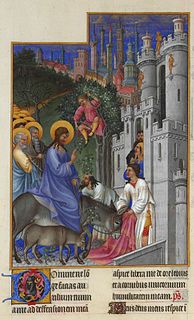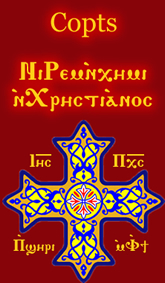
Great Lent, or the Great Fast, is the most important fasting season in the church year in the Eastern Orthodox Church, Byzantine Rite Lutheran Churches and the Eastern Catholic Churches, which prepares Christians for the greatest feast of the church year, Pascha (Easter).
Friday is the day of the week between Thursday and Saturday. In countries adopting the "Monday-first" convention it is the fifth day of the week. In countries that adopt the "Sunday-first" convention, it is the sixth day of the week.

The liturgical year, also known as the church year or Christian year, as well as the kalendar, consists of the cycle of liturgical seasons in Christian churches that determines when feast days, including celebrations of saints, are to be observed, and which portions of Scripture are to be read either in an annual cycle or in a cycle of several years.

Advent is a season of the liturgical year observed in most Christian denominations as a time of expectant waiting and preparation for both the celebration of the Nativity of Christ at Christmas and the return of Christ at the Second Coming. Advent is the beginning of the liturgical year in Western Christianity, and is part of the wider Christmas and holiday season.
Fasting is the willful refrainment from eating and sometimes drinking. From a purely physiological context, "fasting" may refer to the metabolic status of a person who has not eaten overnight, or to the metabolic state achieved after complete digestion and absorption of a meal. Several metabolic adjustments occur during fasting. Some diagnostic tests are used to determine a fasting state. For example, a person is assumed to be fasting once 8–12 hours have elapsed since the last meal. Metabolic changes of the fasting state begin after absorption of a meal.

In some traditions of Christianity, Holy Week is the most sacred week in the Church year. In Eastern Rite Churches, also known as Eastern Orthodox, Holy Week occurs the week after Lazarus Saturday and starts on the evening of Palm Sunday. In the rites of the Western/Latin/Roman Church it begins with Palm Sunday and concludes on Easter Sunday. For all Christian traditions it is a moveable observance. In Eastern Rite Churches, Holy Week starts after 40 days of Lent and two transitional days, namely Saturday of Lazarus and Palm Sunday. In Western Rite Churches, Holy Week falls on the last week of Lent or Sixth Lent Week.

Ember Days are quarterly periods of prayer and fasting in the liturgical calendar of Western Christian churches. These fasts traditionally take place on the Wednesday, Friday, and Saturday following St Lucy's Day, the first Sunday in Lent, Pentecost (Whitsun), and Holy Cross Day, though some areas follow a different pattern. Ordination ceremonies are often held on Ember Saturdays or the following Sunday.

The Eastern Orthodox Liturgical Calendar describes and dictates the rhythm of the life of the Eastern Orthodox Church. Passages of Holy Scripture, saints and events for commemoration are associated with each date, as are many times special rules for fasting or feasting that correspond to the day of the week or time of year in relationship to the major feast days.

The Paschal cycle, in Eastern Orthodox Christianity, is the cycle of the moveable feasts built around Pascha (Easter). The cycle consists of approximately ten weeks before and seven weeks after Pascha. The ten weeks before Pascha are known as the period of the Triodion. This period includes the three weeks preceding Great Lent, the forty days of Lent, and Holy Week. The 50 days following Pascha are called the Pentecostarion.
Orthros or Oútrenya, in the Byzantine Rite of the Eastern Orthodox Church and the Eastern Catholic Churches, is the last of the four night offices, the other three being vespers, compline, and midnight office. Traditionally, in monasteries it is held daily so as to end immediately following sunrise, in contrast to parishes where it is held only on Sundays and feast days. It is often called matins after the office it most nearly corresponds to in Western Christian churches.
The Friday Fast is a Christian practice of abstaining from animal meat, lacticinia as well as alcohol, on Fridays, or holding a fast on Fridays, that is found most frequently in the Eastern Orthodox, Catholic, Lutheran, Anglican and Methodist traditions. The Teaching of the Twelve Apostles, written in the first century A.D., directed Christians to fast on both Wednesdays and Fridays. The Wednesday fast is done in remembrance of the betrayal of Christ by Judas on Spy Wednesday, while the Friday fast is done in commemoration of the crucifixion of Jesus Christ on Good Friday. As such, all Fridays of the year have been historically kept in many parts of Christendom as a day of strict fasting and abstinence from alcohol, meat and lacticinia. In Orthodox Christianity, in addition to fasting from food until sundown, the faithful are enjoined to abstain from sexual relations on Fridays as well.

In Christianity, the Nativity Fast is a period of abstinence and penance practiced by the Eastern Orthodox Church and Catholic Church in preparation for the Nativity of Jesus on December 25. The corresponding Western season of preparation for Christmas, which also has been called the Nativity Fast and St. Martin's Lent, has taken the name of Advent. The Eastern fast runs for 40 days instead of four or six weeks and thematically focuses on proclamation and glorification of the Incarnation of God, whereas the Western Advent focuses on the two comings of Jesus Christ: his birth and his Second Coming or Parousia.
The Catholic Church historically observes the disciplines of fasting and abstinence at various times each year. For Catholics, fasting is the reduction of one's intake of food, while abstinence refers to refraining from something that is good, and not inherently sinful, such as meat. The Catholic Church teaches that all people are obliged by God to perform some penance for their sins, and that these acts of penance are both personal and corporeal. Bodily fasting is meaningless unless it is joined with a spiritual avoidance of sin. Basil of Caesarea gives the following exhortation regarding fasting:
Let us fast an acceptable and very pleasing fast to the Lord. True fast is the estrangement from evil, temperance of tongue, abstinence from anger, separation from desires, slander, falsehood and perjury. Privation of these is true fasting.

The Apostles' Fast, also called the Fast of the Holy Apostles, the Fast of Peter and Paul, or sometimes St. Peter's Fast, is a fast observed by Eastern Orthodox, Oriental Orthodox, Eastern Catholic, and Reformed Orthodox Christians. In the Byzantine tradition, the Fast begins on the second Monday after Pentecost, whereas in the Coptic and old Syriac traditions, the Fast begins on the first Monday after Pentecost. It continues until the Feast of Saints Peter and Paul on June 29. Traditionally, its duration varies from eight to forty-two days because of the moveable nature of Pascha. However, in Eastern Orthodox Churches that follow the Revised Julian calendar, the fast can be as long as 29 days, or may not occur at all in some years.

A Black Fast, also known as a strict fast, is an ancient form of Christian fasting. Those undertaking a Black Fast consume no food during the day and then break the fast after sunset with prayer, as well as a meal devoid of meat, lacticinia and alcohol.

Lazarus Saturday in Eastern Christianity refers to the moveable feast before Palm Sunday to which it is liturgically linked. It celebrates the raising of Lazarus of Bethany. Bethany is recorded in the New Testament as a small village in Judaea, the home of the siblings Mary of Bethany, Martha, and Lazarus, as well as that of Simon the Leper. John's gospel reports that "Six days before the Passover, Jesus came to Bethany, where Lazarus lived, whom Jesus had raised from the dead." Presumably, it is where he spent the Great Sabbath that occurs immediately before Passover, prior to his triumphal entry into Jerusalem. Jesus is reported to have lodged there during Holy Week, and it is where his anointing by Lazarus' sister Mary took place a few days later on Holy Wednesday.

Lent is a solemn religious observance in the Christian liturgical calendar commemorating the 40 days Jesus spent fasting in the desert, according to the Gospels of Matthew, Mark and Luke, before beginning his public ministry, during which he endured temptation by Satan. This season is observed in the Anglican, Eastern Orthodox, Lutheran, Methodist, Moravian, Oriental Orthodox, Reformed, United Protestant and Roman Catholic Churches. Some Anabaptist, Baptist and nondenominational Christian churches also observe Lent.

Fasting and abstinence have historically constituted a major element of the practice of the Ethiopian Orthodox Tewahedo Church, following the counsel of Saint Paul to "chastise the body and bring it under subjection" per 1 Corinthians 9:27. It is generally agreed, and asserted by the Church itself, that the fasting regime of the Ethiopian Church is the strictest of any Church, with 180 mandatory fasting days for laypeople and up to 252 days for clergy and the particularly observant. The general list of fasts are laid out in the Fetha Negest.

A Lenten supper is a meal that takes place in the evenings to break the day's fast during the Christian liturgical season of Lent, which is widely observed by members of the Catholic, Lutheran, Moravian, Anglican, Methodist, Reformed and United Protestant traditions. Lenten suppers occur daily from Mondays through Saturdays at sunset during the Lenten season in the context of Christian family life ; in a communal context, they are often held on Wednesdays on which Christians of various denominations often attend a service of worship and then break that day's Lenten fast together through a community Lenten supper. Lenten suppers are often held in the church's parish hall in the public setting and in the context of a family meal in the home setting. A Mealtime Prayer is always offered before Christians partake in the Lenten supper. When they are held on Fridays, often following the Stations of the Cross devotion, they often take the form of a fish fry given that many Christians practice abstinence from meat on Fridays. Given the Lenten focus on sacrifice, abstinence and plainness, Lenten suppers are simple, having foods like vegetarian soup, bread and water, with no desserts. A basket for alms is often kept in the parish hall and Christians who are participating in the Lenten supper contribute to it; these alms are then given to the poor, as almsgiving is one of the three pillars of Lent. In some communities, Lenten suppers are an expression of Christian ecumenism, with Wednesday Lenten services and Lenten suppers being held at a different denomination's local church each week of Lent. Christians have also invited non-Christians to Lenten suppers to allow them to learn more about Christianity and to build bridges with other faith communities.










